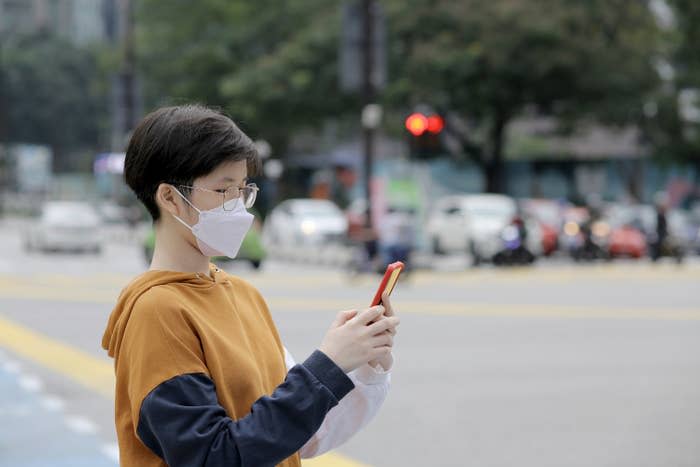Doctors Have Been Seeing Teen Girls Develop Tics And They Think TikTok Might Be Involved
On today's episode of BuzzFeed Daily, we broke down the top pop culture headlines AND discussed the surprising reason teen girls are developing tics. You can listen below or scroll down to read more about the interview!
So let's dive right into it! Recently we talked to The Wall Street Journal’s Julie Jargon about how teen girls are developing physical ailments after watching TikToks. Here's some of what we learned:
BuzzFeed Daily: You wrote a piece for The Wall Street Journal about how teenage girls have been developing physical tics at record rates since the beginning of the pandemic. At first, doctors were stumped, but then they realized that the girls all had something in common. What was it that they discovered?

Julie Jargon: After a number of girls showed up in doctors' offices across the country, and even in other countries, the doctors discovered that they were exhibiting the same types of tics as one another. And a lot of them were explaining to the doctors and showing them on their phones that they were watching TikTok videos of people on TikTok displaying tics, saying that they have Tourette syndrome and other issues that cause tics. And so doctors started putting two and two together and realizing that the tics that these girls in their offices were showing were not only similar to one another, but very similar to the tics that people on TikTok were displaying.
BuzzFeed Daily: To be fair, not all the doctors agree that TikTok is solely to blame. So what are some of the other factors that can contribute to tics?
JJ: Yeah, there's been obviously a lot of stress and anxiety related to the pandemic. And anytime there are high levels of anxiety and depression, those kinds of underlying conditions can cause things like tics. And that's what some doctors are saying, that it might be more to do with that. But according to others, these girls with tics that are similar to those seen on TikTok also have underlying anxiety and depression and other mental health issues that were either brought on by or exacerbated by the pandemic.
BuzzFeed Daily: You spoke to neurologist Dr. Donald Gilbert, who said the tics are real symptoms of functional neurological disorders, meaning they're not just in someone's head. Could you just explain how these TikToks contribute to these tics?

JJ: As it was explained to me by Dr. Gilbert and others, sometimes when someone has psychological stress that they're under, that stress can manifest in physical ways, and sometimes it manifests in ways that patients have seen before. Dr. Gilbert mentioned that he has seen patients in the past who had non-epileptic seizures, and many of those patients had actually witnessed family members who had epilepsy and had seizures. He described it as a disease model where someone has seen a particular type of disease and how it looks, and ends up sort of subconsciously modeling that when they're under some sort of psychological distress.
BuzzFeed Daily: His prescription for unlearning the tics includes cognitive behavioral therapy and taking a break from TikTok for several weeks. We all know that social media is bad for us, but were you surprised to see a doctor recommending this as a medical opinion?
JJ: I was surprised when he told me that that was the first thing he recommends these patients do. I had not heard of that being a recommendation for other issues related to social media use before. So I thought it was interesting that he said to step away from that and stop seeing something that might be triggering for people.
BuzzFeed Daily: You mentioned a famous case from upstate New York, where several teens developed tics that were eventually diagnosed as a mass psychogenic illness, but were mostly confined to a geographic location. This is pretty terrifying considering that social media draws people into these shared communities. So can you explain a little bit about how this case evolved? Also, do you foresee more cases like this happening unless there's some sort of change to social media?

JJ: It's really interesting that there have been cases like this in the past, not only in upstate New York, but other places. They were always one school or one community, where oftentimes it was teenage girls that developed the same sort of symptoms as one another. And this is the first time that doctors have said they've noticed this happening on a very mass scale because of the reach of social media and people being exposed to the same content around the same time.
Could this happen again? I suppose it could. These videos are still there. Doctors have told me that they're continuing to see patients coming in with tics. It hasn't stopped. And whether there could be some other type of behavioral physical manifestation of a stressor that might be witnessed on social media, it's hard to say whether we could see something quite like this again. But I mean, clearly, you're seeing a lot of young people that have been dealing with eating disorders and other mental illnesses and other psychological effects that could be attributed, at least in part to what they're seeing and being exposed to on social media. So I don't think that's going to go away.
BuzzFeed Daily: This all feels very overwhelming and kind of unsolvable. And I guess it just comes with the territory of having new technology and slowly discovering its effect on humans. I think you touched on this a little bit before, but what were some of the most helpful things you learned in writing this piece?
JJ: Some of the doctors have said that just being able to tell these young people that they are in control of this and they can learn to sort of unlearn this behavior has been helpful to a lot of the patients. Some doctors have told me that, not always, but sometimes immediately patients, once they were given a firm diagnosis and told, "You know, we understand you're not faking this, you're not making this up, but you do have the ability to have some control over that" — that has really helped a lot of patients resolve the tics. Maintaining a normal routine was another thing that the doctor said is helpful, that a lot of times when these kids have tics and they have an episode at school, it can feel really embarrassing. It can be disturbing and stressful. And they might go to the nurse's office and go home for the day. But having that disruption and those transitions can bring on tics. And so the better thing to do is just go about your daily life, maintain your routine, don't have those disruptions and transitions if possible.
On the latest episode of their podcast Drama Queens, which is about One Tree Hill, stars Hilarie Burton, Sophia Bush, and Bethany Joy Lenz reunited with their former costar Moira Kelly for the first time in years.

After Hilarie asked Moira if there was anything she’d have done differently during her time on the show, she said she wished she’d have been more present and recognized the abuse the young women were allegedly enduring.
"Hearing, honestly, what all of you young women had to go through...if I could go back, I would've made my presence stronger there," Moira said. "You were all so young coming into this situation, there's a part of me that feels like I let you all down."
Hilarie went on to tearfully tell Moira she was the one who helped her decide to finally leave the show in 2009, adding, “You just set such a positive example for us and you were safe. You didn't have to put any extra effort into it.”
Dax Shepard opened up about the quote “ingenious” way Kristen Bell explains sex to their daughters.

In an episode of his podcast Armchair Expert, he said, "When she describes sex to our children, she says, ‘And then the woman takes the man’s penis and puts it in her vagina.’ So right away it’s like, You’re in charge of this, you will decide to put this in your vagina, not the man puts his penis in your vagina."
He also said he doesn’t subscribe to the trope of dads having to “protect my daughters’ virginity with great prejudice if necessary.”

